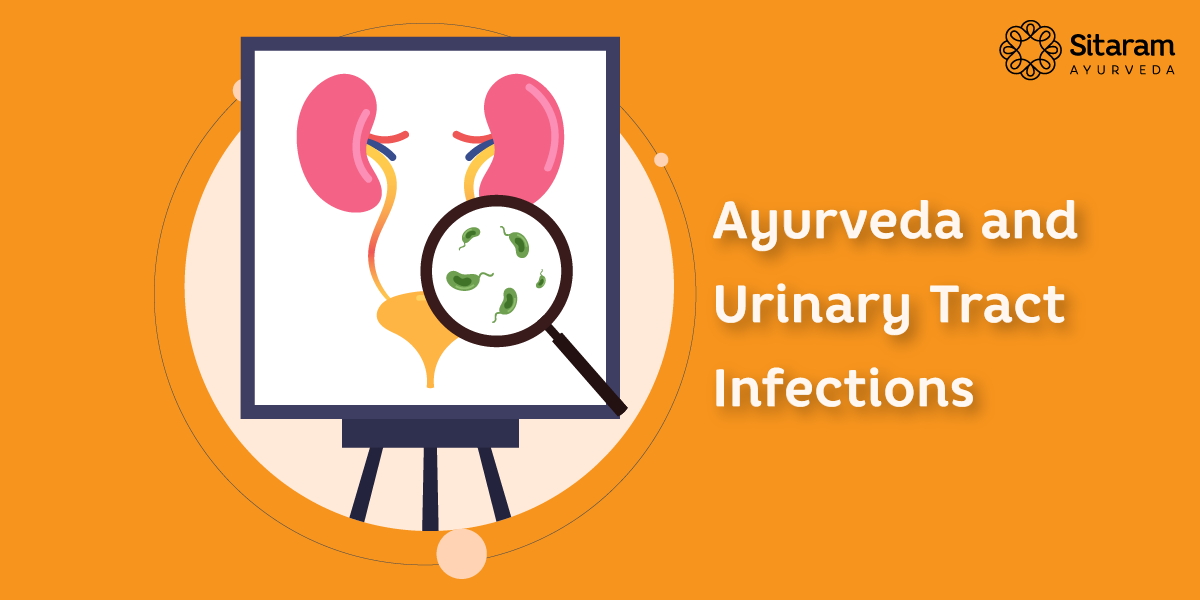Ayurveda and Urinary Tract Infections

Urinary tract infection is one of the most common medical conditions. Women are significantly more likely to experience UTI than men. Almost half of all women will experience some form of UTI during their lifetime.
What are Urinary Tract Infections?
Urine is one of the waste products of the body. Urine made in the kidneys reaches the bladder through ureters. The bladder stores the urine, and it is emptied by urinating through the urethra. Normal urine has no bacteria.
A urinary tract infection is an infection in any part of the urinary system- kidneys, ureter, bladder, and urethra.
Bacteria usually cause urinary infections. Urinary tract infections are the most common bacterial infection.
Most of the infections occur in the lower urinary tract- the bladder and the urethra.
Risk factors of Urinary Tract Infections
- More common in women.
- Urinary tract abnormalities– Babies born with urinary tract abnormalities. These abnormalities back up the urine in the urethra and cause infections.
- Blockages in the urinary tract– Kidney stones and enlarged prostrate trap urine in the bladder and cause infections.
- Suppressed immune system- Diseases that impair the immune system like diabetes can increase urinary infections.
- Catheter use- People who use a catheter to urinate (people hospitalized, people with neurological problems) have an increased risk of urinary tract infection.
Risk factors specific to women for urinary tract infections are
- Female anatomy– Women have a shorter urethra, and bacteria travel easily to the bladder.
- Sexual activity
- Certain birth control measures- Birth control measures like diaphragms may cause an increased risk of urinary tract infections.
- Menopause- A decline in the level of hormone oestrogen causes an increased risk of urinary tract infections.
Signs and Symptoms of Urinary Tract Infections
- A strong urge to urinate.
- Burning sensation
- Passing frequent small amounts of urine.
- Cloudy urine
- Strong smelly urine.
- Pelvic pain in women.
Types of Urinary Tract Infections
Signs and symptoms change according to the part affected
Kidneys (acute nephritis)
- Back pain/ side pain
- High fever
- Chills
- Nausea
- Vomiting
Urinary bladder (cystitis)
- Pain below umbilicus
- Frequent, painful urination.
- Blood in the urine.
Urethra (urethritis)
- Burning sensation
- Discharge
What indicates UTI in urinalysis?
- In a bacterial UTI, WBC (White blood cells) are present in the urine.
- A positive nitrite test result indicates UTI.
Organisms responsible for UTI
Escherichia coli (E.coli) is the most common bacteria responsible for UTI. E.coli usually lives harmlessly in the human intestinal tract. But it causes infections when it gets into the urinary tract.
Various organisms like S.saprophyticus, Proteus species, Klebsiella species, Enterococcus faecalis, etc., are also responsible for UTI.
UTI in pregnancy
Hormonal, mechanical changes and difficulty with hygiene makes UTIs more common in pregnancy.
If left untreated, UTI is associated with a risk to both the fetus and mother.
UTI in children
Studies show that up to 8% of girls and 2% of boys get a UTI by 5.
How do kids get UTI?
Kids get UTI when bacteria enter the urinary tract from their skin or poop.
Signs and symptoms of UTI in children
Infants show fever, lack of interest in food, fussiness.
Some kids who already have been toilet trained may show bedwetting.
In older kids, symptoms are evident.
Complications of UTI
- Recurrent infections, especially in females.
- Kidney damages occur due to untreated UTI.
- Urethral narrowing in men.
Ayurveda and UTI
Ayurveda addresses UTI under the terms ‘Ushna Vata’ and ‘Mutra Krichra’. Classics explain multiple formulations for the treatment.
Ayurvedic Medicines
- Kashayams (decoctions)- Brihathyadi Kashayam, Punarnavadi Kashayam etc.
- Gulika (tablets)- Chandraprabha Gulika
- Choornams (powders)- Gokshura Choornam, Shadanga Choornam
- Arishtams- Chandanasavam, Punarnavasavam etc.
- Single drugs- Gokshura capsule
- Ghrutham (medicated ghee)- Vastyamayanthaka Ghrutham
It will help if you take these medicines under strict medical supervision.
Ayurvedic remedies to prevent recurrent episodes of UTI
As a holistic science, Ayurveda explains many regimens to keep the body healthy. Practicing these methods will help in reducing the occurrence of conditions like UTI.
a)Practise an Ayurvedic diet
- Avoid too sour, spicy, acidic diet.
- Take plenty of fruits and vegetables.
Fruits include
- Pomegranate
- Goose-berry
- Raisins
Vegetables
- Ash gourd
b)Water intake
- Drink plenty of water.
Water boiled using the following medicines will help.
- Gokshura Choornam (Tribulus terrestris)
- Roots of the plant Punarnava (Boerhavia diffusa)
- Seeds of Dhanyakam (Coriander)
- Sitaram Dahasamini
Tender coconut water
- Tender coconut water is a good source of nutrients and is a delicious source of hydration.
c)Lifestyle changes
Voiding of urine
- Ayurveda considers urine as a Vega (urge), which is not to suppress. Therefore, try to void urine whenever you feel the urge.
d)Practise proper hygiene after voiding.
e)Practise Yoga
Practicing Yoga postures like Bhujangasana, Dhanurasana, etc. helps to improve genito-urinary functions.
To Buy Ayurvedic medicine for UTI: https://www.sitaramayurveda.com/product/devadarvarishtam/


 Sign In
Sign In Cart
Cart
Hi,
This is about uti treatment
Could I have more information on the method of treatment. I live in Bombay. Is there travel involved if I have to stay a couple of days for the procedure.
Looking forward to your response.
Many Thanks,
Twinkle
Hi
For an online consultation, please visit :
https://bit.ly/3vy1F4d
Our doctors would be happy to assist you better.
We in customer support are not in a position to give you medical advice. I hope you can understand.